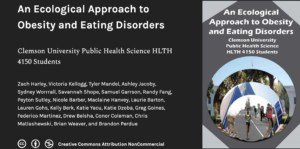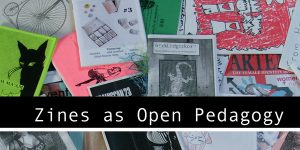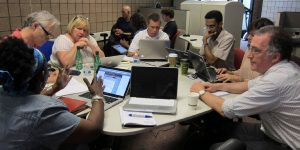This digital textbook was developed through an “open pedagogy” approach with over 100 Austin Community College students contributing footnotes, introductory chapters, digital learning objects, and test bank questions with a student audience in mind. 86 chapters cover 1,000 years of British literature featuring primary source texts commonly assigned for survey courses of British Literature (ENGL […]
An Ecological Approach to Obesity and Eating Disorders
An Ecological Approach to Obesity and Eating Disorders is the work of students of Clemson University’s Public Health Science in collaboration with Clemson Libraries. The students wanted it to be an information guide on various weight-related challenges for the general public. The goals of this project were to meet the course (HLTH 4150 – […]
Non-majors Science Students as Content Creators
For the past three semesters, students in CORE101: Scientific Investigations at Roger Williams University in Bristol, RI have been creating websites on science topics they themselves have deemed important to society. The websites are designed to take the place of a course textbook in this course for non-majors, and are completely written, designed, and edited […]
Students Creating a Shared Annotated Bibliography
Fall semester 2018, first-year students in Integrated Thinking and Writing, ITW-101, section 27 (I called it “Can’t Stay Here!”) at Keene State College in New Hampshire have been collaborating on research about immigration and refugees in the European context. While immigration is a contentious topic in U.S. politics (at the time of writing this post, […]
Open Learning Experience Bingo 2.0
Learning experience bingo is a game invented to offer a way for people to consider how learning experiences — like activities, assignments, modules, or courses — might be “opened” in various ways. For example, a learning experience might be opened by enabling wider access to more people, more agency for people involved, or more possibilities […]
Zines as Open Pedagogy
Often, when speaking about open pedagogy, the emphasis is on the digital: frequently listed examples include Wikipedia edit-a-thons, blog posts, and collectively annotated works. Yet the same principles (transparency, self-driven learning, student empowerment) are also strongly found in zines, a print medium that has long thrived in underground spaces and activist movements. There are many […]
Collaborative Syllabus Design: Students at the Center
“Democratically co-creating learning outcomes with students, based on their goals for the class, situates them at the center of your pedagogy.” – Christina Katapodis I have been meaning to write about collaborative syllabus design for ages. This week’s workshop on learner-centered syllabi in GEDI / Grad 5114 combined with a very cool article by Christina Katopodis on Writing […]
A Little Empathy Goes a Long Way
“Chad, can I talk to you for a second?” It was 2:15pm. I use this time to get ready for my class the next day. I do my photocopying, get tests ready, come up with problems for the students, and basically decompress from the events of the day. As I was head down in a […]
If It Aint Broke, Break It!
Faux Punk Fatigue I’ve been teaching trades now for over nine years. I’ve got some pretty tried and true systems set up. I keep all my worksheets, notes, video links, powerpoints, and lesson plans in Evernote (I’d be dead if Evernote just closed up shop and ran). My lesson plans are meticulous. I have the […]
The Marginal Syllabus and Open Pedagogy
Are you already familiar with the Marginal Syllabus? The 2018-19 syllabus titled “Literacy, Equity + Remarkable Notes = LEARN” has been announced and can be accessed here. What is the Marginal Syllabus? Since 2016, the Marginal Syllabus has convened and sustained online conversations with educators about equity in education through open and collaborative web annotation. […]









